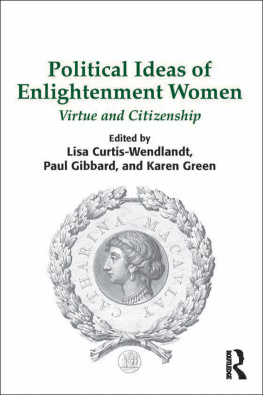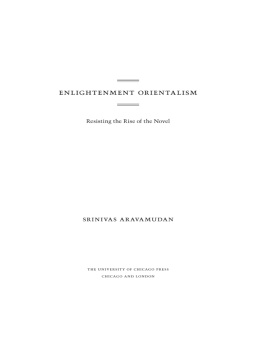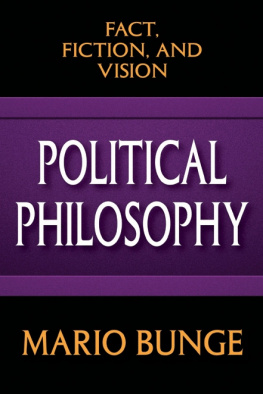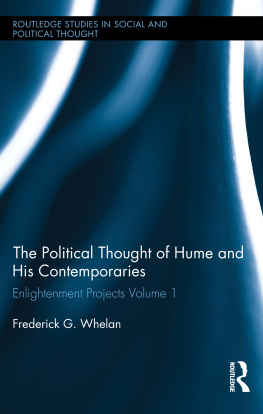
Enlightenment and Political Fiction
The easy accessibility of political fiction in the long eighteenth century made it possible for any reader or listener to enter into the intellectual debates of the time, as much of the core of modern political and economic theory was to be found first in the fiction, not the theory, of this age. Amusingly, many of these abstract ideas were presented for the first time in stories featuring less-than-gifted central characters. The five particular works of fiction examined here, which this book takes as embodying the core of the Enlightenment, focus more on the individual than on social groups. Nevertheless, in these same works of fiction, this individual has responsibilities as well as rightsand these responsibilities and rights apply to every individual, across the board, regardless of social class, financial status, race, age, or gender. Unlike studies of the Enlightenment which focus only on theory and nonfiction, this study of fiction makes evident that there was a vibrant concern for the constructive as well as the destructive aspects of emotion during the Enlightenment, rather than an exclusive concern for rationality.
Cecilia Miller is Associate Professor of History and Tutor in the College of Social Studies at Wesleyan University.
Routledge Studies in Cultural History
For a full list of titles in this series, please visit www.routledge.com
37Visualizing Jews Through the Ages
Literary and Material Representations of Jewishness and Judaism
Edited by Hannah Ewence and Helen Spurling
38Higher Education and the Growth of Knowledge
A Historical Outline of Aims and Tensions
Michael Segre
39New Perspectives on Russian-American Relations
Edited by William Benton Whisenhunt and Norman E. Saul
40The Holocaust in the Twenty-First Century
Contesting/Contested Memories
Edited by David M. Seymour and Mercedes Camino
41Jesuits at the Margins
Missions and Missionaries in the Marianas (16681769)
Alexandre Coello de la Rosa
42Travelling Notions of Culture in Early Nineteenth-Century Europe
Edited by Hannu Salmi, Asko Nivala and Jukka Sarjala
43Language as a Scientific Tool
Shaping Scientific Language Across Time and National Tradition
Edited by Miles MacLeod, Roco G. Sumillera, Jan Surman and Ekaterina Smirnova
44Transnational South America
Experiences, Ideas, and Identities, 1860s-1900s
Ori Preuss
45Enlightenment and Political Fiction
The Everyday Intellectual
Cecilia Miller
Enlightenment and Political Fiction
The Everyday Intellectual
Cecilia Miller
First published 2016
by Routledge
711 Third Avenue, New York, NY 10017
and by Routledge
2 Park Square, Milton Park, Abingdon, Oxon OX14 4RN
Routledge is an imprint of the Taylor & Francis Group, an informa business
2016 Cecilia Miller
The right of Cecilia Miller to be identified as author of this work has been asserted in accordance with sections 77 and 78 of the Copyright, Designs and Patents Act 1988.
All rights reserved. No part of this book may be reprinted or reproduced or utilised in any form or by any electronic, mechanical, or other means, now known or hereafter invented, including photocopying and recording, or in any information storage or retrieval system, without permission in writing from the publishers.
Trademark notice: Product or corporate names may be trademarks or registered trademarks, and are used only for identification and explanation without intent to infringe.
Library of Congress Cataloging-in-Publication Data
Names: Miller, Cecilia, author.
Title: Enlightenment and political fiction : the everyday intellectual / Cecilia Miller.
Description: New York ; London : Routledge, 2016. | Series: Routledge studies in cultural history | Includes bibliographical references and index.
Identifiers: LCCN 2015041769 (print) | LCCN 2015050237 (ebook) | ISBN 9781138954175 (alk. paper) | ISBN 9781315667072 (ebook)
Subjects: LCSH: Fiction18th centuryHistory and criticism. | Politics and literatureEuropeHistory17th century. | Politics and literatureEuropeHistory18th century. | Literature and societyEuropeHistory17th century. | Literature and societyEuropeHistory18th century. | Reason in literature. | Emotions in literature. | EnlightenmentEurope.
Classification: LCC PN3495 .49 2016 (print) | LCC PN3495 (ebook) | DDC 809.3/033dc23
LC record available at http://lccn.loc.gov/2015041769
ISBN: 978-1-138-95417-5 (hbk)
ISBN: 978-1-315-66707-2 (ebk)
Typeset in Sabon
by Apex CoVantage, LLC
For my students
Contents
This book was written as a tribute to E. P. Thompsons The Making of the English Working Class (1963), by telling the story of the making of the everyday intellectual. I realized my connection to Thompsons book in an unexpected way. Some years ago, on a bus ride from Mexico City to Quertaro, I was talking with a Mexican engineer about our respective jobs, and he asked me what my favorite history book was. I immediately answered the E. P. Thompson book, but I was almost as quickly annoyed by my response. As a professor in a very small academic fieldsomewhat ironically, the history of ideasI should have automatically mentioned a book strictly in my own field. Yet this brief encounter was good for me. In time, it helped me realize not just why I am drawn to Thompson, but also how much I have been influenced by other books, books even further beyond my field, and then how these interactions might make me stronger at my own work.
Another intellectual surprise followed, changing the course of my research. At that stage, my research was wholly on eighteenth-century theory, not literature. I had written a book on the philosophy of history and I was ensconced in new research on political economy. Yet it was in my pleasure readingadmittedly, eighteenth-century novelsthat I began to find abstract ideas that were not yet present in the theory of the same time. After some resistance on my part (initially not wanting to blend my reading for work and my reading for myself), this intersection of theory and fiction became the focus of my research. The result of these marked mental transitions is this book, whichfollowing the model of the long eighteenth centurydeliberately blends political economy and fiction.
In the twenty-first century, European literature tends to be discussed in a national context, with the focus on books from only one language. Gullivers Travels, for example, is still most often considered in terms of other works of literature written in English, and not so often in terms of other contemporary works of fiction written in Spanish, German, French, and Italian. Even when theory is introduced into the mix, it is usually theory from the same language as that work of fictionfor example, the influence of John Locke on Jonathan Swift, author of Gullivers Travels. However, in the eighteenth century, European readers and writers were immersed in the best-selling fiction and theory from across Europe, demanding rapid translations of works already well regarded elsewhere. All five of the works of fiction to be examined here were translated very quickly after their first publication.








